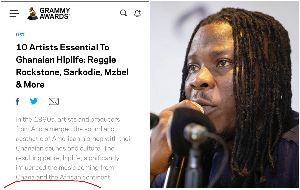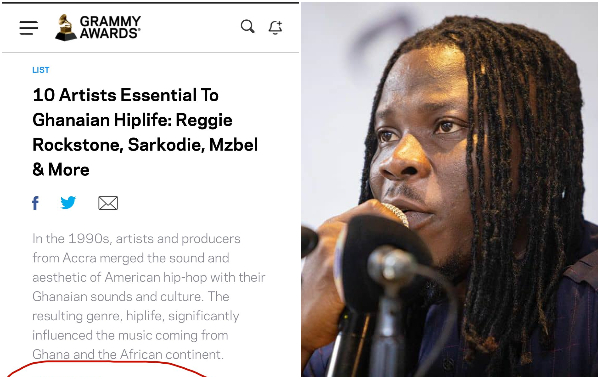 Screenshot from the article and Stonebwoy
Screenshot from the article and Stonebwoy
In the early 1990s, Ghana’s music scene experienced a kind of renaissance. The country’s unique sound, highlife, was remixed into other genres.
What stood out, however, was the hip-life style, a fusion of highlife and hip-hop. Various artists including Reggie Rockstone, Okyeame Kwame, Obrafour and many others took the scene by rapping in the popular Akan Twi.
An article published on August 21, 2024 on the official Grammy website attempted to list some notable artists who have influenced the hiplife sound with their works.
The article listed acts like VIP, Sarkodie, Reggie Rockstone, Obrafour, Black Sharif, Lord Kenya, etc.
However, reggae/dancehall musician Stonebwoy did not like the article and criticized the author and the Recording Academy for not including him in the list.
In a heated post on his X-handle on August 23, 2024, Stonebwoy wrote: “Whoever wrote this article is interestingly missing the name ‘Stonebwoy’. Recording Academy, be careful before publishing half-hearted articles that are supposed to capture the true picture of the state of the Ghanaian sound.”
Stonebwoy’s post sparked criticism from many on social media, asking why the reggae/dancehall musician wanted to be included in a list of hip-life artists.
The controversy also sparked discussions about the hip-life music scene, its pioneers, influential figures and documentaries.
Entertainment journalist Olele Salvador explained in a post that the article focused on key figures in the development of hiplife and not on reggae/dancehall, although some artistes such as Samini and Shatta Wale (formerly Bandana) have had significant hiplife hits.
He stressed that these artists, including Yogi Dogi and Sonni Bali, deserved “honourable mentions” for their contributions during a particular era.
Salvador clarified that Stonebwoy only became known later, when reggae/dancehall became a separate genre in Ghana.
Stonebwoy, in his response, expressed his frustration with the article and questioned why some hip life artists were not mentioned in it. He also argued that he should have been included in the list because he was inspired by many of the artists mentioned and has himself been an influence on the music scene in Ghana.
“@OleleSalvador you should have just mentioned me in your post so that we can have a factual conversation because the article is factually half-hearted and does not represent an opinion because honorable mentions without @PrinceBright_NY (bukbak), @VVipGhana, @iamobrafour, @kwawkese, @LordKenya_one, #Omanhene #akatakyie #Praye @Okyeamekwame.
“When it comes to HIPLIFE, a serious damage is done to Ghana’s music. Being an era with a solid foundation that will serve as an immediate inspiration to my preferences, it would be a mistake not to include STONEBWOY in anything on Ghana Music Today. Enough of the thick flow!” he posted.
Netizens were quick to point out again that some of the artists he mentioned were already mentioned in the article.
The discussion was not limited to Stonebwoy; other artists mentioned in the article such as Shatta Wale, Kwaw Kese and Obrafour also confirmed their mention in the piece.
But overall, the controversy has sparked much-needed conversations about the country’s music industry, the artists who have shaped it, and the genres in which they have had the greatest influence.
See the posts below:
In the 1990s, artists and producers from Accra fused the sound and aesthetics of American hip hop with their Ghanaian sounds and culture.
The resulting genre, Hiplife, had a significant influence on music from Ghana and the African continent. ⤵️https://t.co/5GZxutOfAC
— Recording Academy / GRAMMYs (@RecordingAcad) 20 August 2024
Interestingly, whoever wrote this article is missing THE NAME @stonebwoy
.@RecordingAcad Be careful before publishing half-hearted articles that are supposed to capture the true picture of the state of the Ghanaian Sound. https://t.co/uWzvurB3uv pic.twitter.com/NDqZgRqaJs— 1GAD (@stonebwoy) 23 August 2024
@OleleSalvador You should have just mentioned me in your post so we could have an informed conversation.
Cz the article is factually half asleep and it is not an opinion, because honorable mentions without @PrinceBright_NY (letter) @VVipGhana @iamobrafour @kwawkese…— 1GAD (@stonebwoy) 23 August 2024
According to Grammy 👇🏽 pic.twitter.com/h03QuLK8LJ
— KING KESE (@kwawkese) 22 August 2024
🤣🤣🤣🤣🤣🤣🤣 pic.twitter.com/O95A71TjvE
— SHATTA WALE (@shattawalegh) 23 August 2024
ID/ADG
Click here to follow GhanaWeb Entertainment News WhatsApp channel
Watch a documentary about Uncle Ebo Whyte below:

